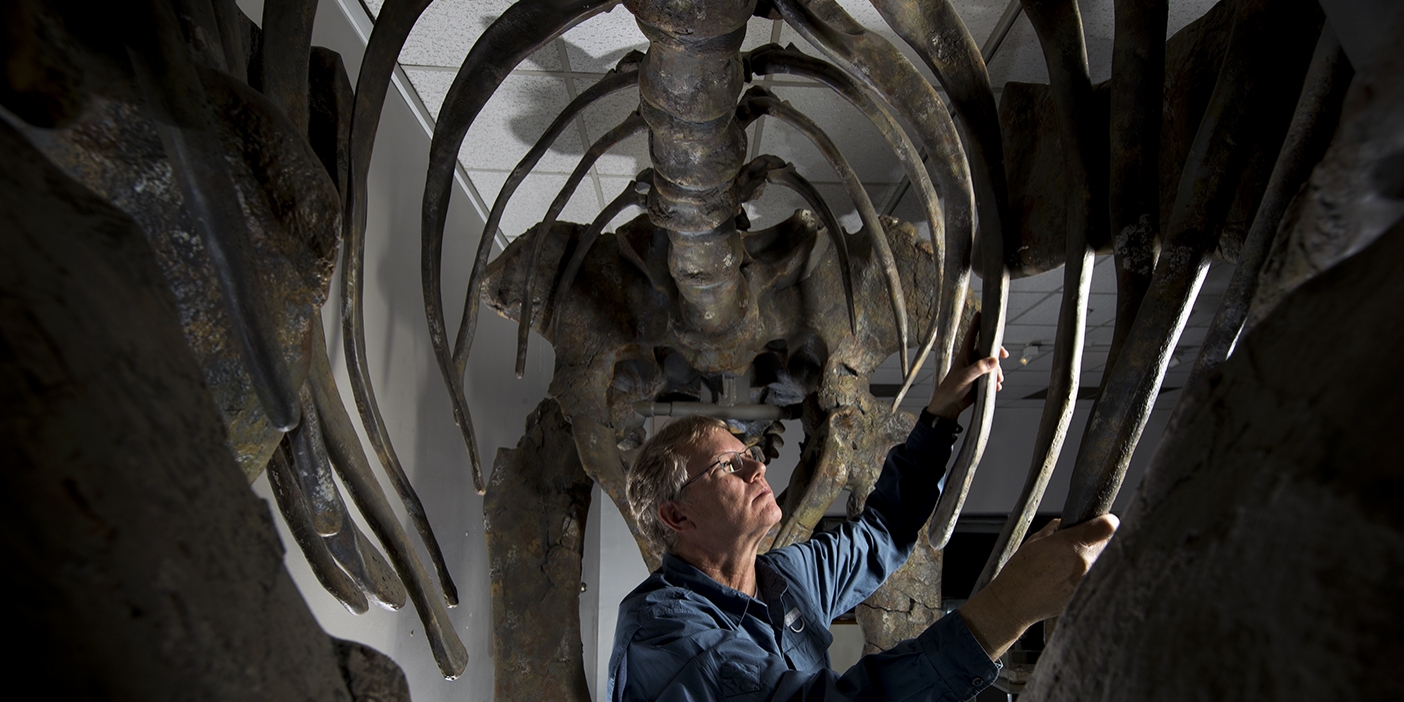God has chosen you to run the final leg of the relay that began with Adam and Eve.

Photo by Bradley H. Slade, ’94
Two Christmases ago I went out to my car one evening to find the passenger window smashed and my briefcase stolen with everything in it—money, credit cards, all of my ID (including the passport that had taken me to 50 countries), and irreplaceable documents. I was beside myself. Hoping the thieves had stolen the money and discarded everything else, a friend and I spent all night prowling through area dumpsters, hoping to find something. But we found nothing.
The next day I began the tedious process of replacing the contents. Suffice it to say, the whole process was a pain. Then, unexpectedly, two mornings later, my phone rang at 3 a.m. It was a Church operator.
“Sister Dew, did you lose a briefcase?”
“Yes,” I answered.
“I have a man on the line who says he found it in a dumpster behind a bar. Been to any bars lately, Sister Dew?” Laughing at her own joke, she connected me with this man whose pickup, as it turned out, had been robbed that night and who had been going through dumpsters. In one he had found a briefcase. My briefcase. When I asked how he had tracked me down, he replied, “When I looked inside the briefcase and saw that Mormon recommendation, I knew this must be important.”
He was referring, of course, to my temple recommend. He had then called the Church number, where the operator on duty knew how to reach me.
The phrase Mormon recommendation instantly reminded me of Mormon’s tender words to his son Moroni: “I recommend thee unto God, and I trust in Christ that thou wilt be saved” (Moro. 9:22). I have often pondered what it would mean to be recommended to God.
In essence, every time we qualify for a temple recommend, our priesthood leaders are doing just that. But on this subject of recommendation there is another dimension to consider. For God our Father and His Son Jesus Christ, with Their perfect foreknowledge, already recommended every one of you to fill your mortal probation during the most decisive period in the history of the world. You are here now because you were elected to be here now (see 1 Pet. 1:2).
This is not new news. You have been told countless times that you are a chosen generation reserved for the latter part of the latter days. In the October 2003 general conference, President Gordon B. Hinckley said once again: “You are the best generation we have ever had.”1 It’s akin to being chosen to run the last leg of a relay, where the coach always positions his strongest runner.
You were recommended to help run the last leg of the relay that began with Adam and Eve because your premortal spiritual valor indicated you would have the courage and the determination to face the world at its worst, to do combat with the evil one during his heyday, and, in spite of it all, to be fearless in building the kingdom of God.
You simply must understand this, because you were born to lead by virtue of who you are, the covenants you have made, and the fact that you are here now in the 11th hour.

Photo by Bradley H. Slade, ’94
You were born to lead as mothers and fathers, because nowhere is righteous leadership more crucial than in the family. You were born to lead as priesthood and auxiliary leaders; as heads of communities, companies, and even nations. You were born to lead as men and women willing “to stand as witnesses of God at all times and in all things, and in all places,” because that’s what a true leader does (Mosiah 18:9; emphasis added).
You were born to lead, and, in the words of Isaiah, you were born for glory (see Isa. 62:2–3).
Now the glorious but sobering truth is that, in spite of your aeons of premortal preparation, the days ahead will at times “wrench your very heart strings,” as the Prophet Joseph told the Twelve.2 If you’ve hoped to passively, comfortably live out your lives, let me burst that little bubble once and for all. Now, please, do not misunderstand me: This is a magnificent time to live! It is a time, said President Spencer W. Kimball, when our influence “can be tenfold what it might be in more tranquil times.”3 The strongest runner wants to run the last leg of the relay.
But the last days are not for the faint of heart or the spiritually out of shape. There will be days when you feel defeated, exhausted, and plain old beat-up by life’s whiplash. People you love will disappoint you—and you will disappoint them. You’ll probably struggle with some kind of mortal appetite. Some days it will feel as though the veil between heaven and earth is made of reinforced concrete. And you may even face a crisis of faith. In fact, you can count on trials that test your testimony and your faith.
Aren’t you glad I came bearing such optimistic news? Actually, I am nothing if not optimistic about you, for everything about your lives is an indicator of our Father’s remarkable respect for you. He recommended you for now, when the stakes are so high. Now is the day when His kingdom is being established once and for all, never again to be taken from the earth. This is the last leg of the relay. This is when He needs His strongest runners.
The simple fact is that our Father did not recommend Eve or Moses or Nephi or countless other magnificent exemplars for this dispensation—He recommended you and me. Do you think God would have left the last days to chance by sending men and women He couldn’t count on? A common theme of patriarchal blessings given to men and women your age is that you were sent now because our Father’s most trustworthy children would be needed in the final, decisive battle for righteousness. That is who you are, and it is who you have always been.
So how will you live up to our Father’s recommendation? Happily, though we must each walk through life on our own, we don’t have to do it alone. Four principles explain why:
First, God wants a powerful people.
Second, He gives His power to those who are faithful.
Third, we have a sacred obligation to seek after the power of God and then to use that power as He directs.
Fourth, when we have the power of God with us, nothing is impossible.
I repeat, God wants a powerful people. Ammon taught that “a man may have great power given him from God” (Mosiah 8:16; emphasis added), and Nephi prophesied that we of the latter days would be “armed with . . . the power of God in great glory” (1 Ne. 14:14; emphasis added).
There are many evidences that God wants a powerful people. This is one reason that at baptism we become eligible to receive “the gift and the power of the Holy Ghost” (1 Ne. 13:37) and the privilege of constant access to the third member of the Godhead.
This is one reason that 12-year-old boys may be ordained to the Aaronic Priesthood, which holds “the key of the ministering of angels” (D&C 84:26).
This is one reason every worthy adult may go to the temple, from which he or she emerges surrounded and protected by God’s power (see D&C 109:22).
God wants a powerful people. No one better understands that Satan is real and that he has power. No one better understands that none of us is smart enough or resilient enough to spar with Satan and survive spiritually. He is a snake, in every sense of that word.
I hate snakes. I’m terrified of snakes. In fact, I’ll go to almost any lengths to avoid even seeing a snake. A few years ago, while visiting the Philippines with its lush, green countryside, I asked a Filipino mission president if there were many snakes in his country. His answer was classic: “Where der is grass, der is snake”—meaning, they were everywhere.
By the same token, Satan is everywhere today. Where there is any kind of dishonesty, immorality, contention, or addiction, there is Satan. He is in blatant sin, he is in subtle deception. Stay away from him. He is “a roaring lion, [who] walketh about, seeking whom he may devour” (1 Pet. 5:8). And he will devour you—unless you “put on the whole armour [or power] of God” (Eph. 6:11), for the power of God is stronger than the power of Satan.
Indeed, the power of God and the power of Satan are as different as night and day. Satan’s power is temporary and will end—in fact, he’s almost out of time. God’s power is absolute and endless. Satan uses his power to destroy and damn; God uses His power to bless, sanctify, and exalt. Satan’s arrogance blinds him; God is all seeing and all knowing. Satan abandons those he spiritually maims, whereas God has promised to make all of His faithful children “joint-heirs with Christ” (Rom. 8:17).
There is only one thing the power of God and the power of Satan have in common: Neither can influence us unless we allow them to. The devil can’t make us do anything. Said the Prophet Joseph: “Satan cannot seduce us by his enticements unless we in our hearts consent and yield.”4 On the other hand, although God could manipulate us, He never has and never will. We “are free to choose . . . eternal life, through the great Mediator of all men, or to choose captivity and death, according to the . . . power of the devil” (2 Ne. 2:27). In short, the kind of power operating in our lives is entirely up to us.
If God wants a powerful people who can withstand the wiles of the devil—and He does—and if we were born to lead in these latter days—and we were—then we need to understand how God makes His power available to us and how we gain access to that power.
Let’s review five ways God makes His power available.
There is Power in the Word of God
Alma and the sons of Mosiah learned that the preaching of the word—meaning the gospel of Jesus Christ—has a “more powerful effect upon the minds of the people than . . . anything else” (Alma 31:5). There is power in the word to heal our wounded souls (see Jacob 2:8), to help us overcome temptation (see 1 Ne. 11:25), to prompt us to repent (see Jarom 1:12), to humble us (see Alma 32:14), to help us overcome the natural man (see Mosiah 3:19), to bring about a mighty change in our hearts (see Alma 5:13), and to lead us to Christ.
President Boyd K. Packer taught:
True doctrine, understood, changes attitudes and behavior.
The study of the doctrines of the gospel will improve behavior quicker than a study of behavior will improve behavior.5
In other words, the word of God can transform us.
I have a lifelong friend whose teenage tampering with pornography evolved into a deadly addiction, and for years it has ruled him and ravaged his marriage. Frankly, I had lost hope that he would ever really change.
And then, a year ago, a remarkable sequence of events began to unfold. He began to study the scriptures for the first time since his mission. The word of God pierced his heart, and he knew he had to repent—which involved heart-wrenching confessions and subsequent excommunication. Now he is working his way back by immersing himself in the gospel as never before.
He wrote me this recently:
It was when I began to study the gospel that I realized I had been under Satan’s power for years. When I finally got on my knees, pleaded for help to change, and surrendered my sins to the Lord, my world turned upside down. This past year has been a crash course in the ways of God and His Son. It has been the most difficult but wonderful year of my life. I wish I could tell everyone who is in a situation like I was to not be afraid to surrender to the Lord. They will find joy like never before in His Atonement. They will feel the Father wrap His arms around them. They will discover there is power in the gospel to really change.
Some may be skeptical about this man’s transformation, believing that “once addicted, always addicted.” But that is not true. The gospel has the power to cleanse and make new, because the word “is quick and powerful,” it “divide[s] asunder all the cunning . . . of the devil,” and it “lead[s] the man of Christ” home (Hel. 3:29). The Atonement is real. My friend is evidence of that. His great change is the change that comes with conversion.
Do you know what we believe? Do you know there is power in the doctrine of Christ to change and overcome weakness? Do you realize that the scriptures contain the answer to every life dilemma? A casual understanding of the gospel will not sustain you through the days ahead, which is why it is imperative that you immerse yourself in the word of God.
This spring I spent two weeks at the United Nations as a White House delegate to an international commission. As I listened to women from around the world debate complex social problems, I didn’t hear them raise one issue that couldn’t be solved by living the gospel. Not one.
There is power in the word.
There is Power in the Gift of the Holy Ghost
The gift of the Holy Ghost is a gift of power. The Holy Ghost inspires and heals, guides and warns, enhances our natural capacities, inspires charity and humility, makes us smarter than we are, strengthens us during trials, testifies of the Father and the Son, and shows us “all things” that we should do (2 Ne. 32:5). No wonder President Hinckley has said: “There is no greater blessing that can come into our lives than . . . the companionship of the Holy Spirit.”6
Because the Holy Ghost will show us everything we should do, it only makes sense to learn how He communicates—or to learn the language of revelation. Our challenge is not getting the Lord to speak to us; our challenge is understanding what He has to say (see D&C 6:14).
I remember a time when I was desperate for guidance on a crucial decision. I had fasted and prayed and been to the temple, but the answer wasn’t clear. In frustration I told a friend that I just couldn’t get an answer. He responded, simply: “Have you asked the Lord to teach you how He communicates with you?” I hadn’t, so I began to pray daily that He would.
Not long thereafter, while reading about Nephi building the ship, I couldn’t help but notice how clearly he understood the Lord’s instructions. With that, I began to hunt for scriptural evidences of direct communication between God and man. At each one I made a little red x in the margin of my scriptures. Now, many years later, my scriptures are littered with little red x‘s, each an indication that the Lord does communicate with His people—and often. The scriptures are the handbook for the language of revelation. They are our personal Liahona. If you will regularly immerse yourself in the scriptures, you’ll get clearer, more frequent answers to your prayers.
Learning this language takes time. As a young captain charged with leading the Nephite armies, Moroni sent messengers to the prophet Alma, asking him to inquire of the Lord where the armies should go. But in time Moroni received inspiration for his stewardship himself, for he became “a man of a perfect understanding” (Alma 48:11)—suggesting that he learned to speak the language of revelation, perhaps even perfectly.
What a gift to have access to a pure source of information, a source devoid of flattery or spin-doctoring, “for the Spirit speaketh the truth and lieth not” (Jacob 4:13). The Lord will teach us directly as much truth as we are worthy and willing to learn. As Elder Bruce R. McConkie taught, “There is no limit to the revelations [we] may receive.”7
Having the Holy Ghost as our constant guide and protector is essential to latter-day leadership, for the gift of the Holy Ghost is a gift of power.
There is Power in the Priesthood
By definition, priesthood power is the power and authority of God delegated to men on earth. Those who hold the priesthood have the right to say what the Lord would say if He were here. Whatever they bind on earth is bound in heaven.
Because the priesthood was restored, we have access to ordinances: baptism and confirmation, sealings and healings and blessings, miracles, and the ministering of angels. Indeed, “the keys of allthe spiritual blessings of the church” (D&C 107:18; emphasis added) are available through the power and authority of the Melchizedek Priesthood.
There is power in ordinances. All who are baptized and receive the Holy Ghost are eligible to speak the words of Christ and qualify for eternal life. Those who are endowed with power in the house of the Lord need never face the adversary alone. Couples worthy to be sealed at an altar in that holy house are gifted with power. The power of the priesthood heals, protects, and inoculates every righteous man and woman against the powers of darkness.
I will never forget an experience in Cali, Colombia. After a long evening of meetings, the presiding officer asked the congregation to remain seated while we departed. But upon the final “amen,” several dozen priesthood leaders jumped to their feet and formed two lines, creating a pathway from the chapel to a waiting van outside. As we walked through this sheltered passageway, where priesthood leaders symbolized priesthood power, I was deeply moved by the metaphor. It is the power of the priesthood that marks, clears, and protects the path leading to eternal life. Priesthood power safeguards us from the world, binds heaven and earth, subdues the adversary, blesses and heals, and enables us to triumph over mortality. Every ordinance of the Melchizedek Priesthood helps prepare us to live in the presence of God.
I am deeply grateful for the power of the priesthood and the gift of having full access to this power, which when used righteously is the only true power on earth.

Photo by Bradley H. Slade, ’94
There is Power in the House of the Lord
It is precisely because of priesthood power—the fulness of which is available only in the temple—that we may be endowed with power in the house of the Lord. The Prophet Joseph Smith made this clear at the Kirtland Temple dedication, when he prayed “that thy servants may go forth from this house armed with thy power” (D&C 109:22).
For years now I have attended the temple frequently. It is a place of refuge and revelation. I could never have handled the pressures of recent years without regular time there. This past year, however, a head-banging, hand-wringing challenge has driven me to attend even more. There have been weeks when the only peace I felt was in the temple. Even still, about six months ago, nine words from 1 Nephi leapt off the page: “And I, Nephi, did go into the mount oft” (1 Ne. 18:3). Instantly I knew I needed to spend even more time in the temple. So I have.
The results have not been what I expected. Although I have received help with the challenge in question, it seems that the Lord simply needed me to be in the temple more where it is easier to learn certain things. That was apparently Nephi’s experience as well, for as he went “into the mount oft,” the Lord “showed unto [him] great things”—undoubtedly great things of the Spirit.
In the temple we learn how to deal with Satan, how to live in the world without letting it stain us, how to fulfill our foreordained missions, and how to come into the presence of God. The best place to learn about the temple is in the temple. Our kept covenants will eventually save us. And that is power!
There is Power in the Atonement of Jesus Christ
Until I was in my 30s, I thought the Atonement was basically for sinners—meaning that it allowed us to repent. But then I suffered a heartbreaking personal loss and began to learn that there was so much more to this sublime doctrine.
My solution initially to my heartbreak was to exercise so much faith that the Lord would have to give me what I wanted—which was a husband. Believe me, if fasting and prayer and temple attendance automatically resulted in a husband, I’d have one.
Well, the Lord hasn’t even yet given me a husband; but He did heal my heart. And in doing so, He taught me that He not only paid the price for sin but compensated for all of the pain we experience in life. He taught me that because of His Atonement, we have access to His grace, or enabling power—power that frees us from sin; power to be healed emotionally, physically, and spiritually; power to “loose the bands of death” (Alma 7:12); power to turn weakness into strength (see Ether 12:27); and power to receive salvation through faith on His name (see Mosiah 3:19). It is because of the Atonement that, if we build our foundation on Christ, the devil can have no power over us (see Hel. 5:12).
There is power in God the Father and His Son Jesus Christ—power that we may access through the word, the Holy Ghost, the priesthood, and the ordinances of the holy temple.
What then must we do to access this power? May I suggest three things?
First of all, have faith. Faith is the first principle of the gospel because faith is a principle of power that influences, to at least some degree, the Lord’s intervention in our lives.
By faith Noah built an ark and saved his posterity, Sara gave birth “when she was past age” (Heb. 11:11), Moses parted the Red Sea, Alma and Amulek were delivered from captivity, and the sons of Helaman were miraculously preserved.
“So great was the faith of [the previously insecure] Enoch that . . . he spake the word of the Lord, and the earth trembled, and the mountains fled” (Moses 7:13). So great was the faith of the 14-year-old Joseph that when he went into a grove of trees and asked “in faith, nothing wavering” (James 1:6), the Father and the Son appeared, ushering in the Restoration.
Faith is a principle of power, which explains why President Hinckley has repeatedly declared: “If there is any one thing you and I need in this world it is faith.”8 Our prophet knows whereof he speaks.
Soon after President Hinckley was called to serve as a counselor to President Spencer W. Kimball, the health of the prophet and his two other counselors failed, leaving President Hinckley to shoulder the burdens of the presidency alone. At one point he recorded:
“The responsibility I carry frightens me. . . . Sometimes I could weep with concern. But there comes the assurance that the Lord put me here for His purpose, and if I will be humble and seek the direction of the Holy Spirit, He will use me . . . to accomplish His purposes.”9
Throughout his life, President Hinckley’s practice has been to simply go forward with faith.
Prophets ancient and modern stand as witnesses that the Lord will indeed use His matchless power to help us. Surely the brother of Jared’s transcendent privilege of seeing the Lord was linked to his expression of faith:
I know, O Lord, that thou hast all power, and can do whatsoever thou wilt for the benefit of man; therefore touch these stones. . . .
. . . O Lord, thou canst do this. [Ether 3:4–5]
In this instance, as in many others, faith allowed the Lord to do not just what was asked of Him, but much more.
Challenges that tax our faith are usually opportunities to stretch and strengthen our faith by finding out if we really believe the Lord will help us.
If your faith is wobbly, if you’re not sure the Lord will come to your aid, experiment, put Him to the test: “Even if ye can no more than desire to believe, let this desire work in you” (Alma 32:27). A great place to start is in the scriptures. As Jacob wrote: “We search the prophets, and we have many revelations . . . ; and having all these witnesses we obtain a hope, and our faith becometh unshaken” (Jacob 4:6).
Unshaken faith activates the power of God in our lives, “for he worketh by power, according to the faith of the children of men” (Moro. 10:7).
Second, we can increase our access to godly power through repentance and obedience.
Faith in Jesus Christ leads us to repent—or turn away from sins that hold us spiritually captive—and to obey with exactness. Great power follows those who repent and obey.
Lamoni’s father pledged to “give away” all his sins to know God (Alma 22:18). Today I invite you to do the same. What favorite sins, large or small, are you willing to give away—right now, today—to increase your access to the power of God?
Repentance is, frankly, just plain smart, because sin makes you stupid: Stupid because you are deaf, dumb, and blind to the ways of the Lord. Stupid because habitual sin drives the Spirit away, leaving you outside the protective influence of the Holy Ghost. Stupid because it makes you incapable of drawing upon the powers of heaven. Being stupid costs a lot.
Sin costs a lot, too. It can cost time, money, peace of mind, progress, self-respect, your integrity and virtue, your family, the trust of those you love, and even your Church membership.
Sin is just plain stupid. And the cost is off the charts. So repent now. Repent daily. If you want to be sanctified, repentance is not optional.
Obedience, on the other hand, is brilliant, and its fruits are endless—one of which is happiness. The only way that I know to be happy is to live the gospel.
It is not possible to sin enough to be happy. It is not possible to buy enough to be happy or to entertain or indulge yourself enough to be happy. Happiness and joy come only when you are living up to who you are. King Benjamin clearly understood this when he admonished us:

Photo by Bradley H. Slade, ’94
Consider on the blessed and happy state of those that keep the commandments of God. For . . . they are blessed in all things . . . ; and if they hold out faithful to the end . . . they may dwell with God in a state of never-ending happiness. [Mosiah 2:41]
Satan no doubt bristles at this principle, for happiness is something the ultimate narcissist will never experience. I have yet to meet the man or woman who is happier because he or she was dishonest or because they were addicted to something or because they were immoral. The Lord blessed us with covenants that keep us on the straight and narrow path because this road less traveled is actually the easier road. It is so much easier to be righteous than to sin.
This summer I was invited to speak on the subject of the family to a gathering of United Nations diplomats. I agonized over what to say to such a diverse group. In the end I simply shared my personal experience. I explained that my parents had taught me as a child that personal virtue was essential for a happy marriage and family and that in my youth I had made promises to God that I would live a chaste life.
I then acknowledged that I was about to turn 50 and that, though I had not yet married, I had kept my promise. “It hasn’t always been easy to stay morally clean,” I admitted, “but it has been far easier than the alternative. I have never spent one second worrying about an unwanted pregnancy or disease. I have never had a moment’s anguish because a man used and then discarded me. And when I do marry, I will do so without regret. So you see,” I concluded, “I believe a moral life is actually an easier and a happier life.”
I worried about how this sophisticated audience would respond to a message about virtue and abstinence, but much to my surprise they leapt to their feet in applause—not because of me but because the Spirit had borne witness of the truth of that message.
The happiest people I know are those who repent regularly and obey. They have increased their access to the power of God.
Third, to increase the power of God in our lives we must diligently seek. There is perhaps no more frequent invitation or reassuring promise in all of scripture than this one: “Seek me diligently and ye shall find me; ask, and ye shall receive; knock, and it shall be opened unto you” (D&C 88:63).
Notice that God never said, “Seek me a zillion times. Beg again and again and, maybe, just maybe, if you’re lucky, I’ll help you a little.” To the contrary, the two greatest of all beings are ever ready to help us—no call waiting, no voice mail.
Most of the revelations received by the Prophet Joseph Smith came after diligent seeking, including this magnificent promise:
I, the Lord, . . . delight to honor those who serve me in righteousness. . . .
Great shall be their reward and eternal shall be their glory.
And to them will I reveal all mysteries. . . .
And their wisdom shall be great, and their understanding reach to heaven. . . .
For . . . by my power will I make known unto them the secrets of my will. [D&C 76:5–10]
Clearly there is no limit to what the Lord is willing to teach and give us.
The question, then, for you and me is, How much power do we want to have, and what are willing to do to obtain it? Heber C. Kimball said:
The greatest torment [the Prophet Joseph] had . . . was because this people would not live up to their [spiritual] privileges. . . . He said . . . he felt . . . as though he were pent up in an acorn shell, and all because the people . . . would not prepare themselves to receive the rich treasures of wisdom and knowledge that he had to impart. He could have revealed a great many things to us if we had been ready.10
Spiritual privileges that call forth the powers of heaven are available to all who diligently seek them. God wants a powerful people; but, again, how much power we learn to access is up to each of us.
The question, then, is: Will you diligently seek? Listen to this classic passage from Alma: “Whosoever will come may come and partake of the waters of life freely; and whosoever will not come the same is not compelled to come” (Alma 42:27). Notice that this passage doesn’t say that just the popular ones or the smart ones on full scholarship or the ones who got married at 21 may come. It says “whosoever will”—meaning it is our choice.
Those of you who served missions didn’t ask investigators, “Would you like to come to Church? Would you like to be baptized?” Instead you asked, “Will you come? Will you be baptized?”
So today I ask, “Will you increase your faith? Will you repent and obey? Will you diligently seek? Will you learn to access the power of God so that you can live up to the heavenly recommendation that placed you here now? Will you do what you were born to do?”
In his last major address as prime minister, and while World War II still raged in the Pacific, Winston Churchill said this to his countrymen:
I told you hard things at the beginning of [this war]; you did not shrink, and I should be unworthy of your confidence . . . if I did not still cry: Forward, unflinching, unswerving, indomitable, till the whole task is done and the whole world is safe and clean.11
I told you hard things at the beginning of this message. But I’ve also brought reassurance that if you will learn to draw upon the power of God, you will not shrink. You will go forward—”unflinching, unswerving, indomitable”—making the world safer and cleaner until you’ve done everything you were born to do. For you were born to lead. You were born to build Zion. You were born for glory. Everything you do in life should be measured against this grand standard.
President Gordon B. Hinckley said it this way at a BYU devotional in September 1996:

Photo by Bradley H. Slade, ’94
Stand strong. . . . You can be a leader. You must be a leader, as a member of this Church, in those causes for which this Church stands. . . . The adversary of all truth would put into your heart a reluctance to make an effort. Cast that fear aside and be valiant in the cause of truth and righteousness and faith.12
My dear young friends, I repeat that these are the days in which a true leader wants to live. These are days when opportunities to change lives and even destinies are nearly endless. You are running the anchor leg of the relay because you were born to lead. You were born for glory.
In conclusion, in the words of Moroni, “I would commend you to seek this Jesus of whom the prophets and apostles have written” (Ether 12:41) so that you experience for yourself the power in Jesus Christ to strengthen you, to sanctify you, and to help you run this leg of the relay. Don’t ever underestimate the power of Jesus Christ to help you. Isaiah said it this way:
Hast thou not known? hast thou not heard, that the everlasting God, the Lord, the Creator of the ends of the earth, fainteth not, neither is weary? . . .
He giveth power to the faint; and to them that have no might he increaseth strength. . . .
. . . They that wait upon the Lord shall renew their strength; they shall mount up with wings as eagles; they shall run, and not be weary; and they shall walk, and not faint. [Isa. 40:28–31]
I have learned for myself that this is true—that because of our Father and His Son, we don’t have to run this last strenuous leg of the relay alone. We have access to the greatest and grandest of all power. And when we have the power of God with us, we truly can do all things—including everything we were born to do. And we were born to lead. We were born for glory.
Sheri Dew, president and CEO of Deseret Book Company, delivered this devotional address Dec. 9, 2003.
Feedback: Send comments on this article to magazine@byu.edu.
Notes
1. Gordon B. Hinckley, “An Ensign to the Nations, a Light to the World,” Ensign, November 2003, p. 84.
2. Quoted in a speech by John Taylor, June 18, 1883, Journal of Discourses, 26 vols. (London: Latter-day Saints’ Book Depot, 1854–86), vol. 24, p. 197.
3. Spencer W. Kimball, “Privileges and Responsibilities of Sisters,” Ensign, November 1978, p. 103.
4. The Words of Joseph Smith, ed. Andrew F. Ehat and Lyndon W. Cook (Orem, Utah: Grandin Book Company, 1991), p. 65.
5. Boyd K. Packer, “Little Children,” Ensign, November 1986, p. 17.
6. Gordon B. Hinckley, Boston Massachusetts Regional Conference, priesthood leadership session, April 22, 1995; quoted in Teachings of Gordon B. Hinckley (Salt Lake City: Deseret Book, 1997), p. 259.
7. Bruce R. McConkie, A New Witness for the Articles of Faith (Salt Lake City: Deseret Book, 1985), p. 490; emphasis added.
8. Gordon B. Hinckley, “God Shall Give unto You Knowledge by His Holy Spirit,” Speeches of the Year, 1973 (Provo: BYU, 1974), p. 109.
9. In Sheri Dew, Go Forward with Faith: The Biography of Gordon B. Hinckley (Salt Lake City: Deseret Book, 1996), p. 393.
10. Journal of Discourses, 26 vols. (London: Latter-day Saints’ Book Depot, 1854–86), vol. 10, p. 167.
11. Winston Churchill, “Forward, Till the Whole Task Is Done,” London BBC radio broadcast, May 13, 1945, in Blood, Toil, Tears, and Sweat: The Speeches of Winston Churchill, ed. David Cannadine (Boston: Houghton Mifflin, 1989), p. 266.
12. Gordon B. Hinckley, “Stand Up for Truth,” BYU 1996–97 Speeches (Provo: BYU, 1997), pp. 25–26.









